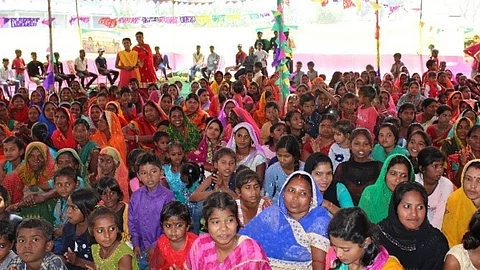
- Topics
- Feature
- Opportunities & Events
- About
- Hindi Portal
- Data
- Topics
- Feature
- Opportunities & Events
- About
- Hindi Portal
- Data

S M Sehgal Foundation is implementing a project “WASH for Healthy Home” engaging ten women’s groups in partnership with CAWST and supported by Fig Tree Foundation in Jafrabad Panchayat, district Vaishali, Bihar.
The project focuses on behavior change toward safe drinking water, handwashing, and sanitation practices. These women’s groups are undergoing structured WASH education sessions for sensitisation and awareness building.
Under this project, S M Sehgal Foundation organised a Swachhata Samaroh (Cleanliness Celebration) on March 27, 2022. More than 450 women from all women’s groups engaged in promoting WASH behavior, participating enthusiastically to showcase their progress, and coming together to learn new things.
The overall purpose of this Swachhata Samaroh was to bring together these group members on one platform and celebrate their WASH behavior change journey within their individual clusters. The celebration served as a recognition of women working in the project area, so that they take pride in bringing about change and adopting WASH behaviors.
Village Mukhia (village head), along with his ward members and Jeevika coordinator, enthusiastically witnessed the progress in the celebration, which started with the welcome from Lalit Sharma, principal scientist, Water, Research and Training, S M Sehgal Foundation. Village Mukhiya and Santosh Kumar Singh and ward members inaugurated the celebration by lighting the lamp. The celebration continued with introduction of group leaders. Each group leader, introduced themselves and shared their experiences of their WASH journey.
A few experiences shared:
• Shobha Devi, a group leader from Khokhsa Kalyan village, shared that she used to drink water directly from the hand pump, due to which she and her family were suffering from gastrointestinal diseases and spent 700 rupees a month on medicine. She said that whenever she used to go on the field, she felt very ashamed of frequent burping. Shobha Devi says that after learning about the importance of safe drinking water, she adopted a MatiKalp water filter. For almost a year, she has been drinking the MatiKalp filtered water. “I feel better, and we do not need those medicines anymore.”
• Ranju Devi of Khokhsa kalyan village is another beneficiary of MatiKalp. She shared that her children were suffering from stomach aches, diarrhea, and other related problems. After using MatiKalp, her children are healthy, and the money spent on medicine is now being saved. She said there are rare visits to doctor after adopting MatiKalp water and using safe hand-washing practices.
• Nirmala Devi from village Mohamadpur Lakhanpur shared that she was educated on cleanliness and hygiene in group sessions, such as why, how, and when to wash hands. Now her family is very cautious about handwashing and always use the filtered water for drinking and cooking.
After the introduction and experience sharing, a quiz competition took place with around forty questions asked from the groups (related to safe drinking water, hand hygiene, maintenance of filter, food hygiene, kitchen hygiene, use of a hand-washing station, etc.). Most group members participated in the quiz competition and answered very confidently.
As part of the program, a storytelling session was conducted, modeled around local WASH scenarios. The audience enthusiastically discussed the wrong WASH habits practiced by the characters in the story and discussed why these should be corrected for healthy living.
In a tippy-tap installation competition, ten youths of the project area participated in teams of two. This was carried out using locally available materials (bamboo, plastic bottle, nails, and thread). They described the benefits of adopting a tippy-tap. Based on the quality and details of the establishment, three teams were selected for the award.
The women group leaders felt very motivated and confident after this event and are more enthusiastic to move forward with the WASH focus. The tippy-tap installation competition and the description given by the participants drew the attention of other youth to the importance of adopting and using a hand-washing station.
The project, WASH for Healthy Home, involved WASH behavior changes using knowledge dissemination within the community. Based on a formative study and secondary study, the poorest of the poor households in five clusters were selected. Key objectives included sensitisation and awareness-building on safe drinking water, sanitation, and hand hygiene, and their impact on livelihood, health and economy, education, and dignity, introducing behavior-change enablers within the ecosystem.
With constant community awareness-building sessions, women volunteered to promote safe drinking water practices and hand hygiene among themselves and beyond. S M Sehgal Foundation developed structured community session plans for sensitisation and awareness-building on safe drinking water with the use of a low-cost, sustainable ceramic pot water filter (MatiKalp) and hand-washing station models including a tippy tap.